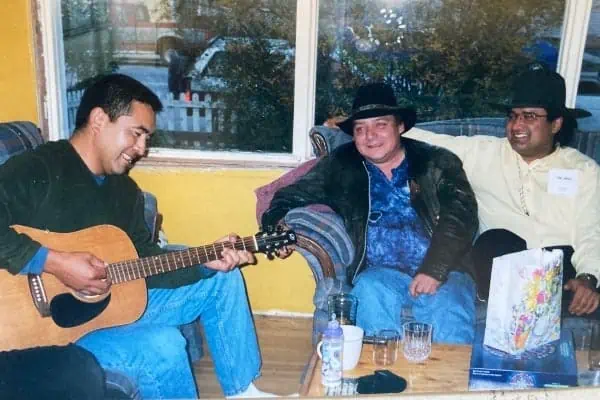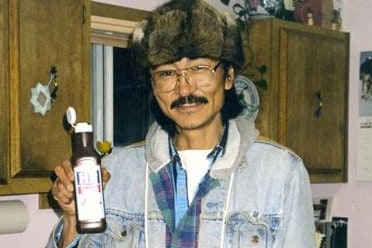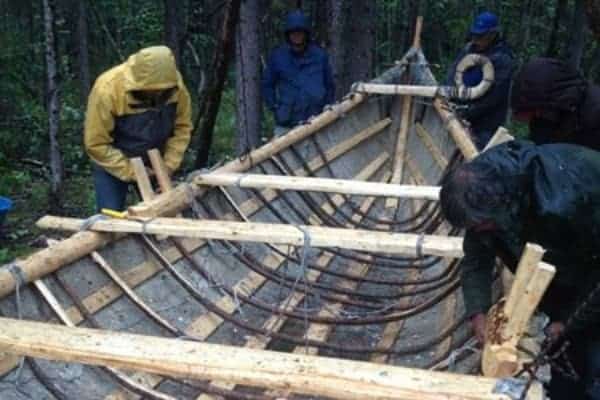As long as I remember, I’ve travelled throughout the Mackenzie Delta and Beaufort Coast with my dad. We travelled all over during different seasons hunting or trapping different animals. Though my parents had moved to town from the trap-line, that primal instinct to hunt and trap never left them. And they took us kids everywhere with them during that time. Sure, they could have raised us on pork chops and potatoes, but they wanted us to learn how to make a living off the land for ourselves. I remember one time I was bitching to my dad after walking for hours through the foothills looking for caribou. His response was, “One day you’re gonna thank me.” Now I get it.
Though I didn’t know it, I was learning to “read” the land. I started noticing when the land was changing, that different animals, plants, fish and birds were also changing. They were either arriving, mating, laying eggs, molting, or migrating either north or south. Some guys are so good they know damned near to the day when the first flock of snow-geese show up in the springtime. The seasons became one cycle after another. And over time, it was like reading a favorite book that you could never put down.
I first started noticing change in the North about 30 years ago. It didn’t really dawn on me, but when I look back on it, I took note of it. And that was seeing different species of vegetation in the Mackenzie Delta. At first it was just a few, but I could tell they were different. And after a while, I’d see bigger and bigger patches along the river. Then it was the slumping of the islands on the Beaufort Coast. Again, it didn’t register what was actually happening, but I noticed it. Especially on our island, Baby Island, where we would go every year to hunt Beluga whales. What I didn’t know was that I was witnessing the first effects of global warming.
When you live so close to the land, like we did, it becomes a part of you. And when something like global warming begins to happen, it’s like it’s happening to you. You take it personal. Every time I see drastic changes in the environment, something inside me changes too. Like a part of me is dying. I can’t imagine what the elders who still live their traditional way of life must feel. You feel violated.
Every day I read something in the news about climate change/global warming. Just today I read that in Alaska, there is no more pack ice. Pack ice is like a barrier to the fall storms. It protects the land from the ravages of storm surges. And now they are discussing the possibility of relocating some of those communities because they are washing into the ocean.
I was up in Tuktoyuktuk this summer and I saw first-hand how the community’s shoreline is eroding at a rapid pace. I remember as a kid there was a beach that extended hundreds of feet out into the ocean. Now that beach has been replaced by a wall of rip rap boulders that had to be placed there to prevent the storm surges from eroding the shoreline. Some residents wonder why the powers that be have not built proper surge protectors, or wave baffles, but it looks like it’s too late.
When people use the term Mother Earth, it’s pretty close to the truth. Because in the North, it is like your mother. Especially in small, isolated Indigenous communities where they still depend on the land to sustain them. The caribou, moose, seal, walrus, polar bear and fur-bearing animals feed and clothe the people. They harvest migratory birds, net fish in the lakes and streams, pick berries, and gather roots and tree sap for medicine. Their relationship with the land and water is an intimate one.
If we as a human race, are going to survive the ravages of rapid and destructive climate change, then the western world needs to adopt a different world view. Because as it stands, their relationship with the land was severed when they quit being foragers (an anthropological term for cultures which gather food and sustenance from the land) and began to master the universe by unlocking its secrets. If we could all learn to live with less, then perhaps we as a species have a chance of survival. But time will tell.




